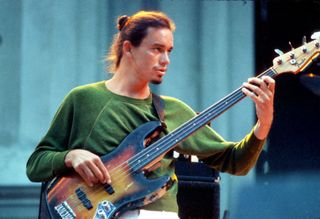For Metallica bassist Rob Trujillo, Jaco Pastorius’ influence cannot be overstated; in fact, it’s no stretch to say that without Jaco’s influence, Rob might well be following a very different path today. Which is why Rob spent five years writing and co-producing the Jaco documentary about the mercurial jazz bassist, whose virtuosic approach to playing has informed the styles of a considerable chunk of today’s top bass players.
Featuring previously unreleased home movies and rare archival footage, the film also includes absorbing firsthand accounts from Jaco’s family, his former band mates and latter day legends like Geddy Lee, Flea, Sting and Bootsy Collins.
Discussing the project with Metal Hammer, Rob explained, “I first saw him perform with Weather Report at the Santa Monica Civic Auditorium back in 1979. When I saw Jaco play, it blew my mind.”
All told, Rob would see Jaco live five times before his untimely passing in 1987 at the age of thirty five, after a scuffle with a club bouncer sent him into a coma.
Insisting that the story is anything but a niche project for the jazz community, Rob told us, “The whole point is to share the story with the world because it’s a great human story. It’s not just about bass or jazz, per se, it’s beyond that. This person had a bipolar disorder, he was homeless and he did some incredible things in a short amount of time. But then, as happens to so many geniuses in the art world, things take over their lives and with him, there was alcohol and a chemical imbalance working against him. It’s really an important story and I felt like I should be the one to try and get it to the world and get it to the fan base.”
“Words can’t even describe the journey that we’ve been on with this film project,” Rob says. “It’s been a rollercoaster ride. It’s kind of like making an album — you go into the trenches and you have moments of frustration and glory and all that stuff. It’s an intense journey, so I’m so happy to see the finish line right in front of me, and I mean that more in the sense that it feels accomplishment and everybody that’s been involved has put a lot of passion in it.”
- My First Love: Rob Trujillo on Santana’s Abraxas
- Steve Harris voted World's Greatest Bassist
- Metallica ‘stealth’ release took Robert Trujillo by surprise
- Stressful day? Unwind with this jazzy version of Dio's Holy Diver

After the success of Robert Trujillo’s documentary about the man who re-invented bass playing, we investigate some of Jaco Pastorius’ career highlights
Bass players across all genres worship him as a god. For the uninitiated, Jaco Pastorius’ virtuoso bass lines and technique changed the sound and possibilities of what was generally perceived as a do-the-basics instrument. His fretless work with Weather Report and Joni Mitchell made him briefly a lionised name.
Yet sadly, after his heyday of the late Seventies, he was diagnosed with bipolar disorder in 1982. He fell prey to alcohol and drugs, and was effectively homeless by 1987, when he died after a fight with a bouncer at a Santana concert, where he’d snuck onstage before being ejected. A sorry end, in his mid-thirties, for a man called “arguably the most important and ground-breaking electric bassist in history”. At least the music from his imperial phase survives.
Bright Size Life (from Bright Size Life, Pat Metheny, 1976)
Born 1951 in Pennsylvania, John Pastorius was given his nickname “Jocko” for his love of baseball. A French pianist assumed the correct spelling was “Jaco”, which the bassist liked so much he adopted it. He’d injured his wrist badly at 13, requiring surgery, and it’s safe to say this affected his unorthodox style. Joining Metheny and drummer Bob Moses for the guitarist’s debut led to a dream of asymmetrical phrasing. Pastorius allows Metheny most of the limelight but is a perfect contrapuntal force. This title track has since been included on the Smithsonian Institution’s jazz anthology.
All American Alien Boy (from All American Alien Boy, Ian Hunter, 1976)
With the former Mott The Hoople frontman perhaps witnessing the success of Bowie’s Young Americans, Hunter required talented musos to surprise glam-rock audiences with a fresh direction. Pastorius played bass across this still-underrated album, bringing colour to numbers like You Nearly Did Me In (with Queen on backing vocals) and God (Take 1). It was the wordy, insistent title track which best gelled sax-funk and beat-poetry to carry a slow-burning kick. How regrettable that Pastorius didn’t bring his flavours to rock stars’ opuses more often.
Suite - Golden Dawn (from Land Of The Midnight Sun, Al Di Meola, 1976)
An early giant in the jazz fusion field, guitarist Di Meola’s own debut — he was just 22 — went boldly for everything from a Bach sonata to mini-Moog solos, involving every key name in the genre from bassist Stanley Clarke to keyboardist Chick Corea. For most though, the highlight is this three-part, 10-minute suite, which presents Pastorius’ strange blend of stutter and flow in all its nascent glory, his confidence growing rapidly. Already, only Clarke was still playing in a comparable league.
Coyote (from Hejira, Joni Mitchell, 1976)
What a productive year ’76 was for the 24-year-old wonder kid. His “discovery” by Joni, as the genius singer-songwriter counter-intuitively “went jazz”, brought his name to an entirely new audience. His subtly dazzling performances on her albums were nothing short of game-changing. While it didn’t sell overly well at first, Hejira is now generally recognised as one of the decade’s high water marks. Pastorius only played on half the tracks, but the opener Coyote introduced a new style of Mitchell sound in which her free-form compositions were given breath by his hard-to-ignore but easy-to-love lines, as affecting in their way as her literate lyrics. No regrets here.
Birdland (from Heavy Weather, Weather Report, 1977)
While waiting to record his own debut, Pastorius had attended a Weather Report gig in Miami. Afterwards he accosted frontman keyboardist Joe Zawinul, and told him they’d be better with him in the band as he was the greatest bass player in the world. Zawinul has said he told him to “get the fuck out of here”, but when Pastorius left a demo at his hotel room the next day he realised the young man had a valid point. Heavy Weather, the group’s eighth album and second with Jaco, gave them a new commercial clout, and Birdland became a jazz classic. Rolling Stone remarked that whereas their music previously “only went up and up”, Pastorius’ “busy, talkative” style gave them “a new bottom that makes all the difference in the world”.

